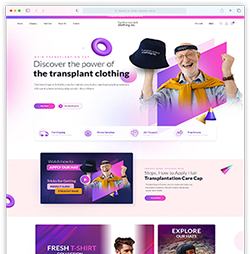In the fast-paced world of digital marketing and web development, HubSpot has emerged as a powerful tool for businesses aiming to enhance their online presence. As a HubSpot web developer, mastering certain skills is crucial to effectively leveraging the platform's capabilities. This article explores the essential skills every "HubSpot web developer" should have, providing insights into how these competencies can contribute to successful web development projects.
Proficiency in HTML, CSS, and JavaScript
A solid understanding of HTML, CSS, and JavaScript is essential for web development. These fundamental languages form the backbone of any website and are crucial for creating visually appealing and interactive pages.
- HTML: Understanding HTML is essential for structuring content on web pages. "A Certified HubSpot developer" should be adept at using HTML tags, attributes, and semantic elements to ensure that the content is well-organized and accessible.
- CSS: CSS styles HTML content, making websites visually attractive. Proficiency in CSS enables developers to create responsive designs that work seamlessly across various devices and screen sizes. Knowledge of CSS frameworks like Bootstrap can also be beneficial.
- JavaScript: JavaScript adds interactivity to web pages, enhancing the user experience. A HubSpot developer should be comfortable with JavaScript and its libraries (such as jQuery) to implement dynamic features and functionalities.
Understanding of HubSpot CMS
.webp?width=732&height=472&name=Understanding%20of%20HubSpot%20CMS%20v1%20(1).webp)
HubSpot CMS (Content Management System) is a unique platform that offers various tools for creating and managing web content. To build and maintain websites effectively, a HubSpot web developer must be familiar with its intricacies.
- HubL (HubSpot Markup Language): HubL is HubSpot's proprietary templating language. Developers should know how to use HubL to create custom templates, modules, and themes. Understanding HubL syntax and functions is crucial for leveraging HubSpot's full potential.
- HubDB: HubDB is a relational data store that allows developers to create dynamic, data-driven content. Familiarity with HubDB enables developers to build complex web applications and integrate them seamlessly with the HubSpot CMS.
Drag and Drop Editor: HubSpot's drag-and-drop editor simplifies the process of creating web pages. Developers should be skilled in customizing this editor to provide users with a flexible and user-friendly experience.
Experience with SEO Best Practices

Search Engine Optimization (SEO) is vital for ensuring that websites rank well on search engine results pages (SERPs). A HubSpot web developer should be knowledgeable about SEO best practices to optimize websites for better visibility and traffic.
- Keyword Research: Understanding how to conduct keyword research helps create content that aligns with users' search needs. Tools like Google Keyword Planner and SEMrush can assist in identifying relevant keywords.
- On-Page SEO: This involves optimizing individual web pages to rank higher and earn more relevant traffic. Key elements include meta tags, headings, URL structure, and image alt texts.
- Technical SEO: Technical SEO focuses on the backend aspects of a website. This includes improving site speed, ensuring mobile-friendliness, creating XML sitemaps, and implementing schema markup.
Knowledge of CRM Integration

HubSpot is renowned for its powerful Customer Relationship Management (CRM) system. Integrating CRM with websites allows businesses to manage customer interactions and data efficiently. A HubSpot web developer should be adept at CRM integration to facilitate seamless data flow.
- Form Integration: Forms are crucial for capturing leads and gathering customer information. Developers should know how to create and integrate forms with the HubSpot CRM to ensure that data is captured accurately and efficiently.
- Workflows and Automation: HubSpot offers robust automation tools. Developers should understand how to set up workflows that automate tasks such as email marketing, lead nurturing, and customer follow-ups.
- API Integration: Knowledge of HubSpot's API is essential for integrating third-party applications and services. This skill allows developers to extend HubSpot's functionality and create custom solutions tailored to business needs.
Competence in Responsive Design
With the increasing use of mobile devices, responsive design has become a critical aspect of web development. A HubSpot web developer should be proficient in creating websites that provide an optimal viewing experience across a wide range of devices.
- Media Queries: Understanding how to use CSS media queries is essential for applying different styles based on the device's characteristics, such as screen width and resolution.
- Flexible Grid Layouts: Flexible grid layouts ensure that web content is properly structured and adapts to various screen sizes. Frameworks like Flexbox and CSS Grid are particularly useful for creating responsive designs.
- Responsive Images: Optimizing images for different devices improves load times and user experience. Techniques like using the srcset and sizes attributes in HTML help deliver the appropriate image size for different screen resolutions.
Familiarity with Analytics and Performance Optimization
A HubSpot web developer must analyze website performance and optimize it for better user experience and faster load times.
- Google Analytics: Knowledge of Google Analytics helps in tracking and analyzing website traffic, user behavior, and conversion rates. This data is essential for making informed decisions to improve website performance.
- Page Speed Optimization: Tools like Google PageSpeed Insights provide valuable insights into improving website speed. Developers should be skilled in optimizing images, leveraging browser caching, and minimizing JavaScript and CSS files.
- A/B Testing: Conducting A/B tests allows developers to compare different versions of web pages to determine which performs better. This helps in optimizing design and content for maximum engagement and conversions.
Strong Problem-Solving and Debugging Skills
Web development often involves encountering and resolving technical issues. A HubSpot web developer should possess strong problem-solving and debugging skills to identify and fix issues efficiently.
- Browser Developer Tools: Familiarity with browser developer tools is essential for debugging HTML, CSS, and JavaScript. These tools help in inspecting elements, monitoring network activity, and identifying errors.
- Error Logging: Implementing error logging helps in tracking and resolving issues that occur on the website. Tools like Sentry and LogRocket can be used to log and monitor errors.
- Version Control: Knowledge of version control systems like Git is crucial for managing code changes and collaborating with other developers. It allows developers to track changes, revert to previous versions, and work on different branches simultaneously.
Conclusion
Becoming a proficient HubSpot web developer requires a diverse set of skills ranging from technical proficiency in HTML, CSS, and JavaScript to a deep understanding of HubSpot CMS, SEO, CRM integration, and responsive design. Additionally, strong problem-solving abilities, effective communication, and collaboration skills are essential for successful project execution. By mastering these essential skills, HubSpot web developers can build and maintain high-performing websites that drive business success.





.webp?width=732&height=428&name=image%20(26).webp)
.webp?width=732&height=472&name=Understanding%20of%20HubSpot%20CMS%20v1%20(1).webp)



